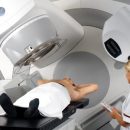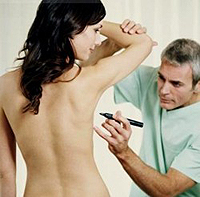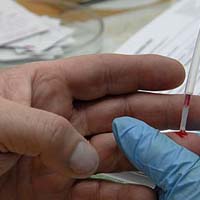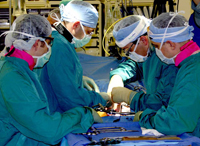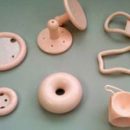In the postoperative period, as after any surgical intervention, side effects may arise and complications. Consider how the recovery period and possible complications are passed after the transurethral resection of the prostate gland.
Content
Bleeding
It is painful?
Return to normal life
Humped urination
Erection
After the operation of transurethral resection of the prostate gland may occur complications.
Bleeding
At the end of the operation for evacuation of urine in the bladder, a flexible tube (catheter) is introduced. She is usually removed in two days. Although at the end of the operation, the ultra eliminates most of the bleeding areas, a certain amount of blood will be distinguished with urine, sometimes a lot of enough, within one or two days. Sometimes blood will be highlighted with clots and block the catheter. If this happens, the doctor or nurse is removed from the clocks (rinsed the catheter) with a syringe.
Many urologists use special catheters to introduce liquid into the bladder to reduce the risk of blood clots.
It is painful?
You will not have a single ordinary view of postoperative pain. But the catheter can cause inconvenience, as well as cause a feeling of overflow of the bladder. Sometimes painful spasms (abbreviations) occur. If they are pronounced, drugs can be appointed to stop spasms. You will be asked to drink every day a lot of water for stimulation of the bladder.
Return to normal life
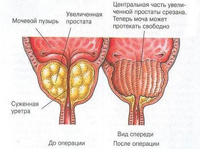
As soon as the catheter is removed, you will almost immediately urinate. Normal is considered to be rapid urination for one or two days; First, urine often it is difficult to manage. The attending physician will teach you some exercises to facilitate urination. Most men return home within a few days after the removal of the catheter. Sometimes at the very beginning it is difficult to fulfill urination, but the persistent classes for several hours lead to the goal. Otherwise, the catheter is again introduced into the bladder. If this happens, do not despair – Usually everything is permitted after re-removing the catheter.
Although there is no painful cut to heal, it is important to understand that inside the prostate gland is filled and the time is necessary for its healing. It takes a few weeks. At this time, the main thing – calm down. Continue drinking a lot of liquid (but not alcohol!). Avoid lift gravity and do not drive a car for 2-3 weeks. During the recovery period, avoid sexual intercourse. From time to time you can see in the urine particles of the fabric – they look like a scree dropping from wounds on the skin. When the scape leaves, sometimes there is a small bleeding.
After surgical treatment of prostate in the urine there are always traces of blood. Sometimes severe bleeding occurs, usually 1-2 weeks after surgery. If this happens, do not panic. Drink a large amount of liquid. If bleeding does not stop after a while, consult a doctor.
Humped urination
Sometimes blood clots make it difficult to urinate. If this happens, you need to return to the hospital, in this case you will be entered the catheter for one or two days. Similar bleeding almost always stop. When bleeding arises due to infection, antibiotics are prescribed.
Since the benign hyperplasia of the prostate gland is developing in most men for several years, usually they immediately after transurethral resection are surprised by the strength of urine jet. Such an improvement is noticeable immediately, but when the main symptom is a rapid urination, it may take more time to become visible to the result of treatment. Sometimes a normal state can return not completely. The need for night urination after the operation can persist because this symptom is often not only the manifestation of the current disease of the prostate, but also a consequence of age-related changes. Another symptom that persists after the operation, – Being at the end of urination. Some men notice this symptom for the first time after surgery. Urine seeps from the prostate cavity. You can cope with this, showing a known caution when urination.
Erection
After the operation, there is almost always the so-called retrograde ejaculation. At the end of the sexual act with normal orgasm, patients feel the same as before, but the sperm does not stand out. Muscle in the neck of the bladder, located above the prostate, is removed along with the gland fabric. This means that cum is seeping into the bladder, instead of standing out. Typically, sex life is not broken, although some men after operation are difficult to achieve erection.
After resection, prostate urine should come back. If the symptoms before the operation were irritating type, the leakage may first happen. In this case, you need medicines for «Soothing» Bladder. Often this is a temporary measure. In rare cases, the lower sphincter is weakened after the operation. This condition improves after special gymnastics. Such a complication is uncharacteristic, but if nothing else helps, a new surgical intervention will be required.
Urine leakage can sometimes be due to the insufficient volume of the prostate and bladder tissue cut, which as a result does not emptily completely. If so, then you need repeated transurethral resection.
Men who performed transurethral resection, – Self «Happy» People in the urological clinic. Most patients are delighted with operation. But some patients are disappointed with the result – Often these are the symptoms of which were pretty moderate, and those who considered that side effects were worse than their original symptoms.
When they talk about the bad result of transuretral resection, this usually means that the operation was not the best method of treatment for a particular patient, and is not related to any complications during surgery. That is why it is important to make in advance all the necessary research. And therefore, the patient must decide for itself, are the symptoms with discomfort of operation and the risk of developing side effects. First of all, you need to contact the urologist to get a useful advice, and it will not be sure to be surgical treatment.
 As soon as the catheter is removed, you will almost immediately urinate. Normal is considered to be rapid urination for one or two days; First, urine often it is difficult to manage. The attending physician will teach you some exercises to facilitate urination. Most men return home within a few days after the removal of the catheter. Sometimes at the very beginning it is difficult to fulfill urination, but the persistent classes for several hours lead to the goal. Otherwise, the catheter is again introduced into the bladder. If this happens, do not despair – Usually everything is permitted after re-removing the catheter.
As soon as the catheter is removed, you will almost immediately urinate. Normal is considered to be rapid urination for one or two days; First, urine often it is difficult to manage. The attending physician will teach you some exercises to facilitate urination. Most men return home within a few days after the removal of the catheter. Sometimes at the very beginning it is difficult to fulfill urination, but the persistent classes for several hours lead to the goal. Otherwise, the catheter is again introduced into the bladder. If this happens, do not despair – Usually everything is permitted after re-removing the catheter.

